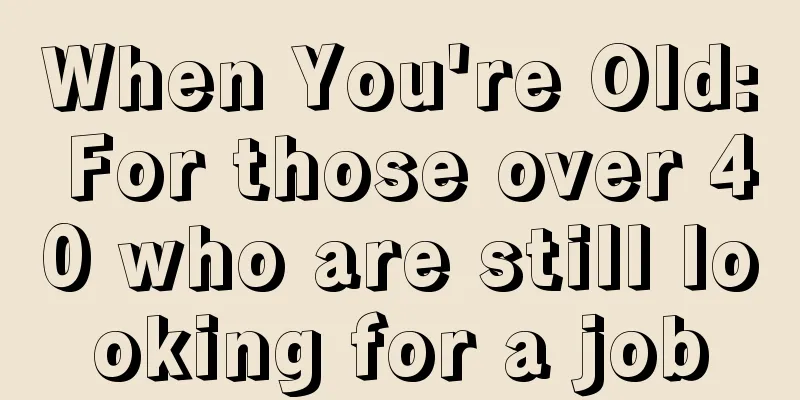When You're Old: For those over 40 who are still looking for a job

The Phantom Thieves' special guest, the ill-considered Fujii Itsuki Located in the northeast, it is a coastal city. In 2014, I was 34 years old. One morning in March, I was walking with the general manager of the company in the factory area. During that time, I received a phone call, which changed my destiny. The company was established three years ago, but has been stagnant due to financing reasons, and dozens of employees in the company are in a dilemma of doing nothing. Fortunately, the group's head office is rich and does not care about the life and death of such a small factory in the remote northeast. The monthly salary is paid as usual, and the company has also thoughtfully built indoor basketball courts and badminton courts in the park. Every noon, after a morning of idleness in the office and a fairly hearty lunch, colleagues go to the sports venues to play ball and shuttlecock to digest the food and welcome a more leisurely afternoon. The company even dug a fish pond in the open space full of reeds. Every weekend, employees go there to fish; the company doesn't care, there is only one rule: the fish caught must be handed over to the cafeteria as a dish for lunch on Monday. The general manager of the company is not young anymore and doesn't like strenuous sports like playing ball. So every morning at 10 o'clock and every afternoon at 3 o'clock, he would ask me to accompany him for a walk around the factory. I guess the reason why he called me was probably because I am good at chatting, and we could have different topics to chat about while walking every day to kill the boredom of walking. At that time, as the youngest department manager in the company, I was highly regarded by the boss. I also considered myself to be a young leader and was quite proud of myself. Let’s go back in time to 2007, when I was 27 years old and worked for a Fortune 500 company as the head of human resources at a park in Northeast China. At that time, in order to facilitate middle and senior leaders, the park set up a leadership channel besides the employee channel. It had a special shoe cabinet and good slippers that were different from those of employees. Because most of the factory leaders were cadres from Taiwan, this channel was also called the Taiwan Cadre Channel. I was the only mainlander who used the Taiwan Cadre Channel at that time, and I was also the youngest among all middle and senior cadres. That year, I accompanied the park's top leaders to receive a visiting governor. After introducing the factory situation to the governor and the accompanying mayor, the governor was very satisfied. Before leaving, he pointed at me and said to the mayor: We still have to learn from other companies. You see, only they dare to use such young cadres. Everyone laughed, and both the host and the guests were happy. In fact, I look quite old. The governor probably thought I was close to 40, but in his eyes, a 40-year-old factory cadre is already considered young. I was glad that I looked mature. If he knew that I was only 27 years old at that time, he would probably complain that the company did not value him and sent a young man to deal with it. At that time, I was not yet thirty years old, but I was already able to stand on my own and was an old servant of the park. A line of poetry often flashed through my mind: "The horse gallops in the spring breeze, and I can see all the flowers in Chang'an in one day." Thanks to the Fortune 500 platform, I got to know some city leaders at work. One of them was a director who accompanied the governor on the visit with the mayor. I had a lot of contact with him. He was nearly 20 years older than me, but I was able to get close to him and become a "friend regardless of age difference." In March 2014, it was my “friend regardless of age difference” who called me. At that time, he had become a real city-level leader. On the phone, he recommended a company in the city to me, saying that it was also a friend of his and wanted to recruit some talents. He thought I was good and knew the situation of my current company, so he called to ask. I had heard a little about this company, which was a traditional industry with less than 1,000 employees, so I looked down on it and was about to decline. But the leader said that the boss of this company was quite powerful and was running a sunshine industry project with a big European country, so I was tempted. I understand the current situation of the company. There is no sign of starting construction, and there is still a long way to go before I can be promoted to the company's leadership team. I am afraid that it will not be realized in a short time. I have always had experience and interest in new projects, so I verbally agreed to meet over the phone. What happened next was a natural progression. I talked to the vice president and the boss of that company separately. The boss was a member of the National People's Congress and had been in Europe for many years. He was quite impressive and graceful. He described a huge project blueprint to me. This was a popular project in China at that time, and I was quite interested. He seemed to be quite satisfied with me, and the interview went smoothly. So I said goodbye to my boss, with whom I used to walk every day, and submitted my resignation. The boss was quite understanding. He knew that the company's current situation could not retain employees. After a farewell dinner, he signed my resignation application. On April 1, 2014, April Fools' Day, a Tuesday, I took up my new position at the new company as the head of the project department. On December 7, 2020, which was not a holiday, I was notified to leave the company that day. The boss who had described a grand blueprint to me that year was too lazy to even meet me for the last time. In 2020, I was 40 years old and should have reached the peak of my life, but I was full of doubts because the company's vice president informed me that the reason for my dismissal was: "You think about it yourself." Fortunately, the company will pay all the compensation it deserves. Even though I didn't understand the whole thing, I had to pretend to be nonchalant and leave with my bag. I have no intention of evaluating my performance in this company for several years. Maybe I was indeed driven out by the company because of my lack of ability, but this company has a tradition of "cutting leeks" on middle and senior managers, so it is reasonable that our group of middle and senior managers were collectively laid off. I learned about this tradition more than a year after I joined the company. At that time, the boss promoted me out of the ordinary and entrusted me with important tasks, while the group of bosses who had been thriving in the company before me were "wiped out" within a day, which shows their employment style. I didn’t have time to think about it later, because when I wanted to find a job again, I suddenly realized: “You are already old.” What I needed to think about was: how can I find a suitable job. I wanted to find a job locally first, after all, I have children and a lover here, but the result was disappointing. So I turned my attention back to my hometown. After all, the economy in the south is better than that in the northeast. I looked for some relatives and friends, and borrowed their influence in the local area to recommend jobs for me. At first, my target was my hometown, and later I had no choice but to expand to neighboring provinces; but almost all my resumes fell into the sea. Some headhunting companies recommended by friends tried their best to help, but the final conclusion was: your age does not meet the company's requirements. After submitting applications again and again without success, I gradually realized a cruel fact: I am old. 40 years old is no longer an effective age for re-employment. It almost exceeds the age limit for all companies to recruit middle and senior managers. As far as I know, this line is generally 35 years old. What's more, some companies feel that there is no need for examination after the age of 30. Actually, I deserved it. When I was 35 years old, my boss asked me to move out of the project department and take charge of the human resources department. Since I was born in the first month of 1980, my boss made this requirement to me: the new cadres recruited cannot be older than you. I was quite complacent at the time, thinking that all the people I recruited were born in the 1980s, and that the team was young and energetic, which would make it easier to carry out work. Five years passed in a flash, and I returned to the project department to work on projects with my boss. I didn't even realize that I was five years older, but the company's recruitment red line was actually at 35 years old, not 1980. I started school early, one or two years younger than my classmates, and graduated from college at the age of 21. Although I had some setbacks in my career, after I joined the Fortune 500, the company expanded rapidly and hired a large number of young cadres, and I was a beneficiary. In addition, because my wife is from Northeast China, the company invested in Northeast China, so I signed up to build a factory, and got more promotion opportunities than my peers. So at the age of 26, I was already leading a functional department team independently. Later, the Fortune 500 companies adjusted their internal legal persons, some cadres were parachuted in, and a group of cadres were to be withdrawn. Due to family reasons, I didn't want to go to the south again, and I felt very good about myself. In addition, with the help of a headhunter, I decided to leave the Fortune 500. Of course, the company I went to was not small. It was a large group that ranked among the top state-owned enterprises. I went to the group's branch in Dalian and served as a department manager. I worked there for two years, and after building the branch from scratch and holding a grand opening ceremony, I left again and returned to the small coastal city. The reason was that the former leader of a Fortune 500 company came back and wanted me to go back with him to help him. Out of my nostalgia for my original company and leader, I decided to resign. I remember what the young CEO of the group branch said to me when he tried to retain me: "In fact, the company can operate without anyone. I just feel sorry that you have lost such a big platform." I was determined to return to the Fortune 500 and was completely unmoved by what the CEO said. It was not until 10 years later that I suddenly realized the truth and woke up from my dream. As fate would have it, I did not return to the Fortune 500, and my leader who called me back did not come back either, so I had to look for a job again. Fortunately, soon I was hired by another group company, which happened to be building a factory in a coastal city. This was the company I mentioned at the beginning of the article that had built a factory and recruited the right people within three years but could not start construction. Three years after joining the company, I chose to change jobs again. Three years later, I was fired by the company. I couldn't help but believe in the saying "karma pays off". The once young cadre, after jumping between four companies, ended up as a middle-aged man. I have to admit that I may have made one mistake after another, and finally ended up at this step. I was unwilling to choose to invest in a project with my friend, a project that seemed to have great prospects; my friend was not even short of money, he just wanted to take me with him so that I could have a career. But I sadly discovered that my twenty years of business experience could not be transformed into the ability to start my own business. People who are used to listening to orders and solving problems are not used to independently discovering problems and creating business opportunities. Coupled with the unpredictable environment, I soon gave up and stayed at home in a daze. When the night is quiet, I look back at my colleagues who stayed in the Fortune 500, state-owned enterprises and large groups. Perhaps they admired my ability to judge the situation and it seemed that the higher the job title, the higher the salary, but they held on to their posts; even though the companies of the Fortune 500 and large groups in the coastal city have been dissolved, most of them have been properly resettled, and as these platforms expanded rapidly, they got more opportunities and room for advancement. Many of my former subordinates have now held high positions, and even become provincial governors, enjoying the limelight. I was very depressed during that time, and with my broken marriage as a factor, I had no idea where to go next. I could only heal myself late at night, and it was extremely painful. Fortunately, God did not let the blind sparrow starve to death. Finally, through the recommendation of my former colleague, I got an opportunity to do my job in a large group. Now that I have just joined the company, everything seems to be on the right track. Of course, as my colleague said, it is too late now, and the company's opportunities are reserved for young people. Just do your job steadily and don't think too much. I understand his subtext. After learning from the painful experience, as a 41-year-old middle-aged man, it actually takes courage to talk about my own mental journey, especially the shameful side. These bloody facts also made me reflect deeply. Maybe I can summarize something, not necessarily make any truths, but providing some reference for my peers will satisfy my wish. First: When changing jobs, you must move from a small company to a large company, not the other way around. There is no need to elaborate on the current economic environment. Only large companies have a certain ability to resist risks. When big waves come, the first things to be overturned are small boats, followed by giant oil tankers. Moreover, there are more opportunities and room for error in large companies. In a large company, if you perform poorly for a while, as long as it does not overly touch the company's management bottom line, the usual practice is to transfer you to another position or another area. "Oranges in the south of the Huai River become tangerines in the north of the Huai River", and perhaps you can be reborn. In a small business, there are not so many jobs and space, and the most likely thing you can do is either eat and wait for death or be fired. Second: If you want to learn, big companies are far better than small companies. For example, I attended a group meeting right after I joined the new company. During the three-day meeting, we conducted intensive training on many topics. We cannot say that all these trainings were practical, but at least they allowed the audience to receive useful knowledge. In the small companies I worked for before, we usually only thought about two questions: Did the boss come today? Is the boss happy today? As for the exploration of modern management and operations, do you think that in an era of fierce competition where people are struggling to survive, bosses will have the time to do this? Third: If it is not necessary, focus on stability. If you really want to change jobs, look for another one while you are still employed. As I just said from my own experience, as employees of our age, we basically reach the management level. If we are familiar with the original company and have the trust of the leaders, the best thing to do is to continue working there. Because when you go to a new company as a middle or senior manager, there will basically be a very long adaptation period. You have to adapt to the strict demands of the senior leaders, and also face the tests and scrutiny of your subordinates. But if you want to change jobs, in addition to referring to the first point, the most important thing is to look for another job while you still have one. First, your employed status will allow you to have a certain degree of initiative during the interview, and second, you will not be under greater financial pressure. Fourth: Don’t try to start your own business easily. Perhaps in the past ten years of working career, you have accumulated a certain amount of original capital and what you consider to be abundant social resources. In addition, there are many successful entrepreneurial cases around you, which have attracted you and made you feel that you can also be a boss. But before you make a decision, here are a few things to think about:
Judging from my own experience and the cases around me, the vast majority of people plunge into the entrepreneurial trend without thinking it through, and the final result is a dismal failure, and they have to go back to looking for a job. It is really like "you only see the thief eating meat, but don't see the thief being beaten." I guess most middle-aged people engaged in management can easily summarize the above four points, and they vary from person to person. After reading this, many people will laugh at me for being "once bitten by a snake, one becomes afraid of ropes for ten years" and having lost the longing for life and the passion for struggle. If you are the same age as me and still maintain a stronger passion, then I congratulate you; but if you feel sympathetic after reading this, then thank you, these words of mine were not written in vain. I would like to dedicate this article to my peers who are still on the road to success! |
<<: When going out during the May Day holiday, should you trust Dianping or Xiaohongshu?
Recommend
If you had the budget, would you still spend money on traditional advertising?
As customer habits change, businesses are beginnin...
Rapidly break out of the circle on Xiaohongshu: Maximizing celebrity marketing
How to quickly break through the circle on Xiaohon...
E-commerce Double 11 competition: an overview of the four core changes in 2023
The annual Double 11 Shopping Festival is coming, ...
Who is the "eye-catching bag" in the gift box?
The New Year is coming, have you prepared all the ...
Young people gather on Xiaohongshu
In the world of social media, traffic is often kin...
MINISO's 3.88 yuan blind bag backstabbed the working people
MINISO recently launched a 3.88 yuan blind bag, wh...
Who on earth doesn’t know how to use spotlight to generate crowd packs?
As a unique social platform, Xiaohongshu's pre...
Beware of the "AI face-changing" scam! You won't be fooled after reading this article!
With the development of AI technology, which makes...
Analysis of the hot articles on Xiaohongshu: 12 cases to analyze how to create a note with more than 400,000 interactions
The quality of an account depends on the mentality...
Which site is better to open as the second shopee site?
For sellers who have already opened their first si...
How to calculate Amazon shopping cart win rate? How to get the shopping cart?
Amazon is now well known to everyone. Many people ...
Does Amazon require promotion fees? What are the procurement costs?
Merchants who open stores online know that traffic...
500,000 influencers bring 4 billion sales, one article reveals the secret of "deep distribution"
With the changes in the market environment and the...
What is lifestyle e-commerce?
As e-commerce giants compete fiercely for the mark...
Why can't I log in to Wish? What are the reasons?
Some domestic merchants like to sell products on c...









